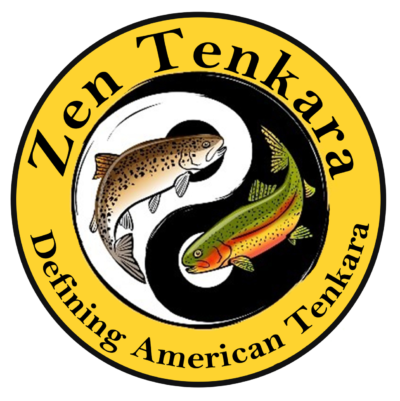
Finally Arrived
I often use the service of fly-fishing guides. I do a lot of destination fishing and in an unfamiliar location, particularly out of state or out of country, I believe guides are invaluable. Their knowledge and expertise go a long way. And while a DIY fishing trip can be a fun filled adventure, hiring a guide can be the difference between a good fly-fishing trip and a spectacular one, especially if time is limited. Guides are local. They know their water, their fish and their flies. I understand too, that affording a guide can be a costly commitment.
When you make that splurge, keep in mind that fishing guides work hard and have long days in the elements. Their success in part, depends on your skill set. That can be a hard pill to swallow with some clients. What happens though, when you have the skills, but your guide doesn’t measure up? Even worse, what happens when you literally fly around the world to fish in a remote destination to discover your guide for the entire trip, how shall I put it, “lacks enthusiasm”. How do you respond?
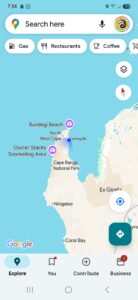
The Gulf of Exmouth
I recently returned from a big fly-fishing trip to Western Australia. It was a long trip, 13 days total, 11 days fishing and more than 30hrs each way. And frankly, it was a pricey trip – one of those trips that for most are a “once in a lifetime” adventure. I returned a few weeks ago and struggle when I’m asked, “How was it”.
I travelled there with my husband, Erik. We left our offices and businesses behind and took off to Exmouth, AU. Our flights went smoothly. Our luggage arrived safely and despite the intense travel itinerary, we felt great and were excited to start fishing.
When traveling to a distant location to fly fish, there are always a number of risk factors that can impact the success of the trip. The ones that have the greatest impact, in my opinion, are weather, your own skill set and, your outfitter/guide. You’re paying and traveling to go fish someplace unfamiliar with someone you don’t know, so there’s a built-in risk factor to begin with. Weather, regardless of historic climate patterns and available information, can be unpredictable. We all know Mother Nature will do her thing regardless of what we want or even what the weatherman predicts. If you book a trip well in advance, you are possibly taking a best guess that the weather a year from now, will be cooperative. Booking agents, whether travel advisors or hosting fly shops that have a solid track record traveling to various fishing destinations can offer advice and recommendations on the best time to go, but there will always be a level of uncertainty.
Our Weather
We made a poor call. Typically, my husband and I try to book most fishing trips around full moon cycles that created big tides. Full moons or near full moons create bigger pushes of water onto the flats. All that water brings with it an abundance of food. Where there is an abundance of food, there is usually an abundance of fish.
Big tides or “big pushes” generally translate into 2 to 4 feet of tide swings when transitioning from low tide to high tide. In some places, the change in water level between tides can be as little as 18 inches. During the time we fished the Gulf of Exmouth, the full moon brought with it a 9ft change in water levels. Nine feet is a lot of water, especially when added to an already deep flat system. While theoretically this big push should have been good, in reality it actually made things more difficult.
Adding to the challenge of the water depth was its lack of clarity. A bit over a week prior to our arrival, Cyclone Zelia had sat off the coast of Western Australia wreaking havoc and making a mess of things due to the high winds and rough seas. The cyclone churned up the water good, resulting in horrible visibility that was made worse by the big pushes of water coming in and out of the area. You couldn’t see squat – even at the bottom of low tide in 3 feet of water. Seeing the ocean floor was tough, never mind seeing fish.

Last one out. First one in.
Sight fishing, for obviously reasons, is easier in shallower water. In shallow water visibility improves and there’s a greater chance to spot fish tailing. We had deep water. We had deep, dirty water. We had challenging fishing conditions. Weather. It just is.
When it comes to sight fishing too, the better you can see fish from a sizable distance, the greater the chance you have at getting into position and putting a good cast on it. The closer it gets to you and the boat, the less of a chance you have at anything good happening. Seeing a fish 10 feet away doesn’t provide much distance to strip your fly and at that close range, the probability that the fish will spook, either from your movement or from the boat, enormously increases. As a consequence of the deep, muddied water Erik and I spent more time than we ever would have imagined or wanted, blind casting, not sight fishing. These were not the desired conditions we had hoped for, but these are known risks and one you have little or no control over.
Our Skills
Something we can control, mostly. My husband and I are pretty good casters. I’m not bragging or boasting. There are tons of anglers better than us, but we are solid in the salt. We can lay some line. Sure, we have our moments where we step on our fly line, miss the target, or can’t see the target, even in excellent conditions. These little issues occasionally happen to even the most skilled and experienced fly casters. These are the moments (after spewing a few curse words) that keep us humbled, humored and striving to be better.
Honestly though, Erik and I both have distance and accuracy down (most of the time). Heck, I even impress myself now and then with a back cast that I don’t even believe, that I made. What I’m alluding to is that the skills are there. We get the fly in there. We’ve worked hard and put the time in to bring a solid skill set to our saltwater fly fishing. It’s a factor in our fishing outcome that, unlike weather, we can control. We practice casting to ensure our skill set positively, rather than negatively, impacts our trip and that any opportunity to place a fly in front of a fish, doesn’t go wasted. So, what’s left?
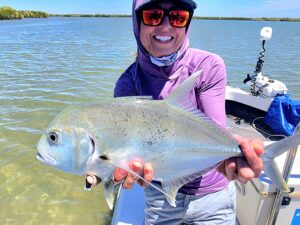
Landed a few small GTs
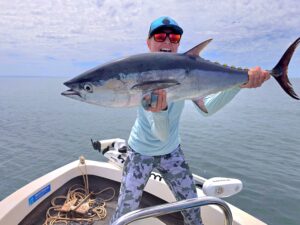
Northern bluefin tuna landed on a Winston Air Max 2 9wt with a back cast
Our Guide
The last major factor to impact the outcome of a fly-fishing destination trip and specifically our recent trip, is/was the guide. A good guide can make or break any trip. If the weather is miserable, a good guide can keep things upbeat and works hard to find you some protection from it, when possible. If your skill set is lacking, a good guide will gently and positively offer some educational and helpful tips. They will work to get you in closer, walk you nearer and position you so that the wind is at your back. A good guide is encouraging and wants you to be successful. Getting you on fish, is what gets them off. Even on the toughest days, a good guide is weighing all the factors and creating the best scenario for your success, because your success is their success.
Many of my guides over the years have become my friends. They are people I have great respect for. They have taught me so much about fishing, casting and about patience. Their positivity and enthusiasm have fueled me on the toughest days when my casting sucked, and the fish wanted nothing to do with me. They have shared my losses, my rejections, my mistakes. They have laughed at me, and they have laughed with me. They celebrate my victories, my accuracy, and yes, my occasional spot-on back casts. I envy their eyesight, dream about their life on the water, and look to them for guidance and direction.
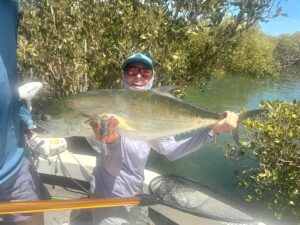
Queen Fish
So, what happens when your guide gives off the vibe that they’d rather have slept in for the day? When they aren’t seeing the fish you’re spotting, or when they consume more beer than you (and consume it before 11am), what do you do? This situation, although relatively uncommon, did occur and absolutely impacted not only the fishing outcome of our trip, but also the overall enjoyment of it. Our guide. He just is. Or is he?
My husband and I traveled far to fish this water. We readily acknowledged the conditions were less than ideal, but we brought our game and were willing to do the work. Our guide, well, not so much. When you travel to fish, you’re reliant on your guide, on their expertise, their knowledge and your inferred partnership. You have in fact paid for their services. If they aren’t following through, do you speak up and hold them accountable? By doing so, do you risk making matters worse? How and what exactly should you say? This became the nightly topic over dinner that Erik and I had during the first half of our fishing trip.
We stayed at an incredible resort, the Mantaray Ningaloo Beach Resort. The rooms were great, the pool fantastic, the food and drinks, delicious. Each morning our guide would meet us in the parking lot to pick us up. Most mornings he was late. There were a handful of other guides in town and a few other fishing guests at the resort. Fly fishing people tend to find each other. We talked to the other anglers and compare our daily experiences. They were very different.

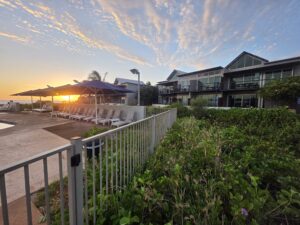
Mantaray Beach Resort
Each day we fished I noticed our boat was the last to launch from the beach and routinely, we were the first boat to return. Even if we were the first to arrive at the beach, somehow, we were still the last boat to head out. While it wasn’t a race, it did mean that the other guides got to choose their preferred fishing spots while we spent a lot of time looking to access a location not already taken. As days passed fish and shots were few and far in between. Erik and I allowed an air of frustration to grow. Time on the water felt nonstrategic and unproductive. Days went by without casting at all while other anglers from the resort were describing very different scenarios. Something needed to change.
Erik and I debated whether we should verbalize our frustration, or whether we should just “suck it up” and go with it. Our guide was not a “happy guy”. We heard a lot about his divorce and other subjects that annoyed him. Saying something could make matters worse. How might we tactfully save the fishing portion of our fly-fishing trip?
Our Decision
After weighing our options, Erik and I decided verbalizing our frustrations would not be helpful. The impression we got from our guide was that he simply didn’t care. No other guides were available, and we had already paid in full. Requesting a refund for the remaining days probably wouldn’t go anywhere. In fact, we found out one of his previous customers who also was unhappy, requested a refund with no success. We concluded we were stuck with him, like the weather, for the remainder of our fishing days. We would make the best of it and try to be clearer in our communications with him.

Golden Trevally
From here on out, each morning Erik would ask the guide directly, “Based on current conditions, what’s the plan for today?” Depending on the guides response Erik or I followed with, “We would like to fish _____. Is this possible?” And be ready with, ” If we can’t do that due to ___, (etc.), then we would like to do this _____. ” And we’d finish with, “Great! I’m looking forward to going ____ and targeting _____” (just to reiterate the plan and confirm understanding).
As a paying customer, you have a right to ask these types of questions, to voice preferences and to speak up if you’d rather spend your time on the water doing something differently. The guide as a professional, should consider your requests and respond. There may be solid reasons for his or her choices and a good guide will explain them to you. Communication is key and it should go in both directions.
At the beginning of your next trip, try laying out your expectations on the first day – nicely. Don’t be a prick. Tell the guide what your goals are. If you prefer walk-wading over fishing off the boat, verbalize that. If there is a species you want to spend more time targeting, say that. Clarify and confirm whether your guide hears and understands what your preferences or requests are. Ask direct questions. Ask, “Is this possible?” “Can this be worked into our day?” Be respectful. Remember, your guide is the local expert and is responsible for keeping you safe.
You have control over your own skill set and how prepared you are for the fishing and casting requirements of a trip. The weather will always be a bit of a gamble, even with access to reliable information. The guide is the X factor. They can be amazing, usually they are great, but on the rare occasion your guide isn’t, you can reduce the risk factor by making it a habit to communicate a few simple inquiries:
- What’s our plan for today?
- Will it be possible to work in the requests that I made?
- How is weather/tides/the current conditions impacting our choices today?
- What is the backup plan?
By talking each day and asking respectful, direct questions, you make your preferences clear, ensure there is a plan and gain an understanding of why the guide has made the choices he or she has made. Subliminally, these conversations also act as a reminder that you are paying for their services. Your preferences (the paying client) should be factored into how the day is spent, in combination with his/her knowledge and expert (the professional) opinion. This is the basis for a successful partnership with a fly-fishing guide.
The majority of guides are incredible. They are hardworking professionals that help you create cherished memories. Most of the time they are passionate anglers who are as thrilled and excited by the fish you land, as you are. Your losses are theirs. Your joys are theirs too. Through clear communication, frustration can be avoided and a solid partnership on the water, established. By asking clear questions and hopefully receiving clear responses from your guide, a relationship is built. This relationship is the foundation from which you change from being a customer, to becoming a returning client, and maybe eventually, a dear friend.
One final note: I did bring tenkara rods and truly intended to fish with them at least part of the time. The opportunity did not present itself. We cast to very few fish and most were way to powerful to attempt to land from a boat in deep water. Sometimes it just isn’t worth it. I hope to have the chance to travel there again and possible hook into a few small queen fish or baby GTs. Fingers crossed.
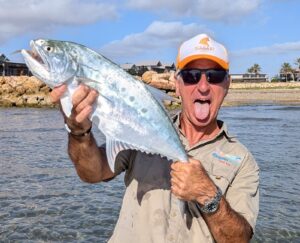
Gave a casting lesson to resort Owner, Nick. Landed his first fish.


